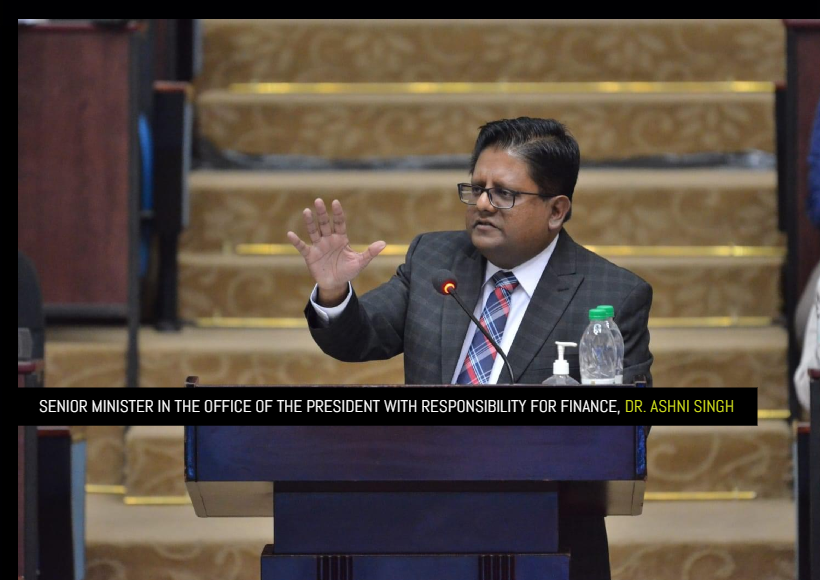The $1.146 trillion National Budget piloted by Senior Minister in the Office of the President with responsibility for Finance and the Public Service, Dr. Ashni Singh was passed in the National Assembly last evening.
The Appropriation Bill 2024-Bill No. 1 of 2024 was passed at the conclusion of the Sitting following five days of debates and four days of Committee of Supply Meetings, during which the Opposition Members meticulously examined the estimates and posed questions to Government Ministers on various line items under each sector.
Budget 2024 imposes no new taxes. It comprises allocations totalling $121.4 billion for wages and salaries for central government employees including a salary increase to be announced later in the year, an allocation of $40.7 billion for old aged pensioners and public assistance beneficiaries, $135.2 billion for the education system to ensure every child receives a good education, including $9 billion for the Because We Care and unform grants for school children.
It also has $129.8 billion for the health sector including the build out of several world class hospitals and telemedicine centres in the hinterland, $204.1 billion to expand and upgrade roads and bridges, laying the foundation for long term economic growth while also bringing relief to commuters and residents, $95.7 billion for the energy sector including investments in doubling the country’s generating capability to halve the cost of electricity, $78 billion to roll out the national housing programme and ensure that every Guyanese family can ultimately own their own home and $72.3 billion to finance the upgrade of D&I infrastructure to grow sufficient food and reduce the risk of flooding.
Natural Resource Fund
Dr. Singh also successfully piloted the (Fiscal Enactments Amendment Bill No. 2 of 2024) in the National Assembly. This was also passed in the House.
During his presentation to Parliament on this Bill Dr. Singh said, “…The Natural Resources Fund (NRF) rule, while allowing for greater financial resources to be available to support intensified public investment and accelerated delivery of social services, the amended rule, as with the existing, will ensure that as production and revenue ramp up further, an increasing share of the inflows into the NRF will be saved relative to the share transferred to the Consolidated Fund to finance these national development priorities.”
He said the revised rule will take effect from this fiscal year and will replace the conservative rule that currently exists in the act.
Prior to expounding further on the Bill Dr. Singh, in reference to the walkout of the Main Opposition party members just before the Fiscal Enactments Amendments Bill could be debated reminded the National Assembly that the APNU/AFC’s walkout was reminiscent of their actions in December 2021 when they disrupted Parliament during consideration of the new Natural Resource Fund Act.
He noted nonetheless that the Bill proposes that the First Schedule of the NRF Act 2021 be amended to reflect revised calculations for the ceiling on annual withdrawals. Under the revised proposals, a sliding scale is proposed for withdrawals from the first US$5 billion of deposits paid into the Fund in the immediately preceding fiscal year. Beyond the first US$5 billion, 90 percent of deposits in the immediately preceding fiscal year will be saved, benefitting generations and generations of Guyanese for years to come.
The Fiscal Enactments (Amendment) Bill also includes provisions for the Removal of Duty and Value Added Tax (VAT) on Sports Equipment and Technology, the Removal of Duty and VAT on Firefighting Equipment, Reducing the Cost of Life and Medical Insurance and an increase in the Income Tax Threshold.
The Income tax threshold, which was last increased to $85,000 in 2023 prior to being increased from $65,000 to $75,000 monthly in 2022, will now be increased to $100,000 monthly resulting in 13,000 persons being removed from paying income tax and a $4.8 Billion increase in disposable income of workers.
In terms of the reduction in the cost of life and medical insurance, in 2022, measures were introduced to encourage citizens to obtain life and medical insurance policies which allowed for a deduction from taxpayers’ chargeable income for premiums paid for life and medical insurance up to a maximum of 10 percent of their income or $30,000 monthly, whichever is lower.
The 2024 Budget now moves this a step further by providing for an increase in the deductible ceiling from $30,000 to $50,000 monthly or 10 percent of income, whichever is lower. This intervention will reduce the taxable income and consequently the tax payable by the taxpayer and will facilitate greater access to coverage for medical costs.
Government has also (in recognition of the importance of sports and technology to human and economic development and especially young people) invested significantly in the development of world class sporting facilities and improving access to and training in Information Communications Technology (ICT). In addition to previously removing VAT on data for residential and individual use along with the applicable taxes on cellphones, the Fiscal Enactment Amendment Bill now paves the way for the removal of VAT and Duty on sports equipment, essential cell phone accessories such as chargers, charging cables and headphones along with phone components for repairs.
Additionally, as a result of a surge in fire incidents across the country, adding to the significant investments in the Guyana Fire Service to boost its firefighting capabilities, the Bill will now allow for the removal of VAT and Duty on fire extinguishers and smoke alarms, in order to promote household fire prevention capabilities.
Debt Ceiling adjustment
The Fiscal Enactment Bill also includes proposals to update ceilings on domestic and external debt. The updated debt ceilings will take immediate effect and will provide government with the flexibility needed to adapt the financing mix depending on the evolving global and domestic economic situation, particularly given global uncertainties regarding interest rates.
The Bill proposes that the domestic public debt ceiling be increased to $1.5 trillion, up from $750 billion from its last revision. Meanwhile, a new external borrowing ceiling of $1.5 trillion was proposed, after its last increase to $900 billion.













